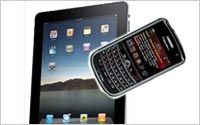Engagement Key To Making Mobile Work
- by Mark Walsh @markfwal, November 26, 2012
 Online businesses face a
serious challenge adjusting to an increasingly mobile world. Some, like Facebook, are dealing better with the “mobile problem” than others like Zynga. But few will be left unaffected by
the mobile transformation underway.
Online businesses face a
serious challenge adjusting to an increasingly mobile world. Some, like Facebook, are dealing better with the “mobile problem” than others like Zynga. But few will be left unaffected by
the mobile transformation underway.
The key to surviving the upheaval is not to adopt a mobile-only strategy, but to extend existing business models to mobile to bridge the digital and physical worlds, according to a new Forrester report authored by analyst Thomas Husson.
That means focusing on ways to build mobile engagement as customers shift from PCs to smartphones and tablets.
Husson casts a skeptical eye on mobile business models, which he argues are still largely unproven. Even seeming mobile success stories like "Angry Birds" maker Rovio and Web radio service Pandora don't look as impressive under closer scrutiny. Mobile may have triggered Angry Birds' popularity, but it has given way to real world merchandising as the company's primary revenue driver.
Still, companies can hardly afford to ignore the mobile revolution. Smartphones and tablets are going mainstream. Global use of the mobile Web and apps will continue to skyrocket. Mobile opportunities will improve as advertisers master mobile engagement and the promise of SoLoMo (social, location, mobile) moves closer to reality through increased knowledge about mobile customers.
So how do companies close the mobile monetization gap while maintaining their current businesses? Husson advises they “obsess about mobile engagement.” That includes developing content and services tailored to mobile devices -- personalized, immediate and contextual. As an example, the report points to the popular Nike+ FuelBand app and bracelet for tracking daily physical activity.
Adapting key performance metrics and measurement systems for mobile is another important step. That means determining what is working in mobile and the resulting ROI. Have the data to answer questions like: When will customers engage and how many minutes will they spend with your mobile services?
Collecting such data, however, requires getting permission from consumers and meeting expectations of privacy.
Husson also recommends that companies build mobile centers of excellence internally to serve as hubs that bring together mobile, social, cloud and big data technologies to build apps and other “smart” products. The recent launch of Mondelez International's Mobile Futures program is an example.
All such steps require funding. Husson says he knows of several companies that each plan to spend more than $100 million in the next three years to make their businesses mobile-ready. “There is no excuse for a lack of investment,” he wrote.


